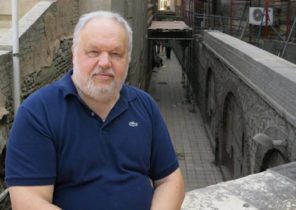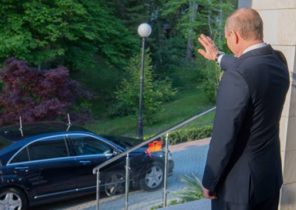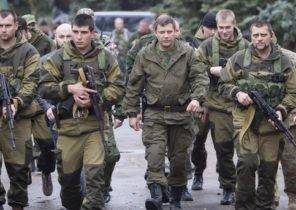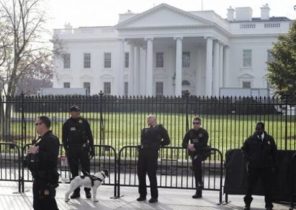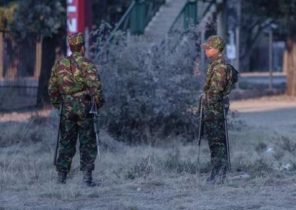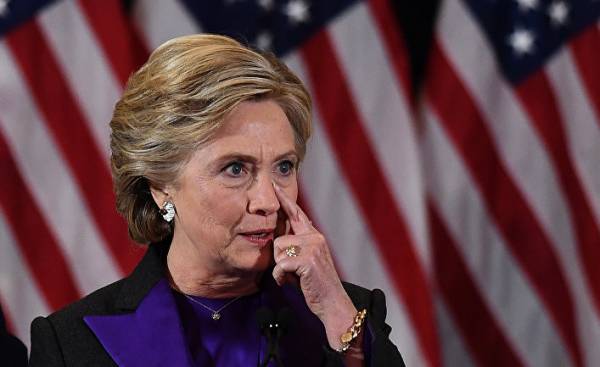
We don’t know how effective had been the attempt of the President of Russia Vladimir Putin to seek election to trump the President. We don’t know if it helped Trump leaked documents, disinformation campaigns, or Russian agents as such “sink” Hillary Clinton. But it is clear — and there is no doubt that Putin did not hide his preferences.
Why? The answer is simple. It’s a hard line Clinton against Russia in her tenure as Senator and Secretary of state, and her tough rhetoric during the election campaign. Many people also believe that since Putin accused Clinton personally in support of the 2011 protests against his government, he felt the desire for revenge.
If you explain more, the reason could be considered the difference between what is represented Clinton throughout his political life, and those that defended trump (the number of ideals it has since changed). If Clinton argued that “the main thing for our foreign policy in this century is the effort to promote democracy and human rights”, and called for a war for these principles in Kosovo, Iraq and Libya, the foreign policy concept of the trump was much closer to Putin’s strategy. The Republican candidate argued that the agenda of the United States should not identify liberal ideals and economic interests and security interests.
We can remember Yugoslavia and to find the origins of the animosity that Putin had for Clinton and her ideology. It was during the NATO air campaign in Kosovo in 1999, then-President bill Clinton contributed to the onset of the current era of militaristic humanism, or “the use of the army to provide humanitarian aid” (i.e., humanitarian intervention under the gun). Bombing Kosovo, Clinton was going to stop the violence by Serbian nationalists led by President of Yugoslavia Slobodan Milosevic (Slobodan Milošević). But taking military action in the country belong to the traditional sphere of Russian influence, Clinton has led the Russian leadership is angry.
The intervention in Kosovo forced Putin to reconsider their priorities. In the winter of 2000 after Putin became President, Russia adopted a new national security doctrine, resulting in calls for partnership with the West subsided. Instead, Russia has decided “to confront unilateralism of America” by “strengthening its position as one of the great powers and influential centers in the world.” A political scientist from Harvard Wallander Celeste (Celeste Wallander), which then became one of the advisers to the US President Barack Obama on Russia, wrote after the adoption of this new doctrine that the tightening of Russia’s position “is clearly related to the assessment of the situation after Kosovo”. Since then, Putin has consistently opposed the ongoing Washington’s “humanitarian” wars, seeing in them the basis of high ideals and unjustified aggression.
One of the reasons that Putin decided that America’s intervention in the Affairs of Yugoslavia has fundamentally changed its priorities, was that it contradicted the basic logic of the current post-cold war world order from which Russia was forced to depend on. With the collapse of the Soviet Union, Russia’s role has decreased significantly, and to maintain stability within the country and maintain its position as a regional force, it relied on the patience and indulgence of the West. But affirming its right to intervene in the Affairs of foreign countries for humanitarian reasons, Washington has shown that sovereign States have to answer to US for their actions inside the country, virtually declaring thereby his newfound hegemony over Russia and all other countries. If the roles were reversed, American leaders such conditions would never have agreed. In addition, this intervention caught Russia off-guard, insulted the feelings of the Russian Pro-European liberals and spurring supporters of tough measures. Just a few weeks after the bombing, Putin was declared the successor of Boris Yeltsin and to the delight of the hawks, which hurt the provocations of the West, immediately began to show military force in Chechnya.
Military “humanitarian” intervention in Iraq and Libya (which Hillary Clinton and other politicians have supported for a number of reasons, chief of which was the humanitarian concerns) also proved destabilizing and, in itself, was a disaster from the point of view of human well-being. In both cases, this intervention resulted in the weakening of the principles of world order that, in Russia’s view, existed after the fall of the iron curtain.
Of course, Putin opposed the use of armed forces for humanitarian assistance, not for ideological reasons. He also claims to be “militant humanist”. Justifying Russian policy towards Syria and Ukraine, Putin and his supporters clearly have resorted to the same arguments which were put forward by the Clinton administration in Kosovo. If NATO can intervene in the civil war in Yugoslavia, why can Russia not do the same in Syria? Moreover, Russia is an ally of Syria and is contractually obligated to protect her government. And if the genocide of the Kurds, who made Saddam Hussein (Saddam Hussein), was the reason for his violent removal from power, then why can Russia not to protect ethnic Russians who are allegedly being persecuted in Georgia and the Ukraine? And if there is a fundamental difference between approaches to humanitarian action with the use of the armed forces, used by Clinton and Putin, it lies in the fact that in the second case the approach is conservative and aimed at preserving existing situation or restore the same. In the first case the aim is to create new States of this type, which is preferred for American politicians and strategists.
When Putin declares humanitarian and contractual rights on the use of force, representatives of all the American parties condemn it, claiming that he is a liar, neoimperialist and dangerous politician, sowing instability. Perhaps the way it is. But Washington also spoke in favor of war in Iraq, which claimed the lives of at least 100 thousand civilians and the intervention in Libya under false pretenses. No wonder Putin thinks Americans are hypocrites when they accuse him that he supports mass murder in Syria.
There are similarities in the approaches of the state: in Kosovo and in Georgia, inferior in number and do not pose threats to the armed forces of small States were attacked by large foreign powers, justifying their actions on humanitarian grounds. Despite the fact that Russia’s war with Georgia (which for many years fought with Pro-Russian separatists in the republics of South Ossetia and Abkhazia) was “absolutely unacceptable,” the official news Agency of the USA crumbles sweet words about how in Kosovo, “like the Clintons”. Years later, the Western press continues to rejoice over the triumph of the humanitarian mission in the Balkans. Again the question arises, what feelings would the Americans, if the roles of our countries has changed?
Given the hypocrisy underlying humanitarian military missions, it is understandable why Putin was opposed to Hillary Clinton becoming President of the United States. Her doctrine was intended to make the world a better place, but its true purpose was to pursue their own preferences at the expense a reckless use of US military power.
It was believed that when the trump will be different: the fact that, in his opinion, is a pointless confrontation, he preferred convergence. As key enablers of U.S. foreign policy instead of liberal values had become such as national wealth and protection from Islamist violence. But then Syria’s President Bashar al-Assad has again used sarin nerve gas against civilians. For trump suddenly became important that the Syrian authorities killed the “beautiful babies”, so the President this month gave the order to retaliate against the Syrian regime, thereby demonstrating that he, like Clinton, is a “militant humanist”. And again, Putin turned out to be psychologically stronger American leader, who believes that he has the right to change the world.
Ruthless denial trump to accept Syrian refugees indicates that it is not particularly concerned about their suffering, their future, or someone who rules their country. He is a “militant humanist” — not like Clinton and Putin. He uses moral arguments and morality not as a justification for idealistic change, but as a new agent in dealing with other countries for power, security and glory — and to ensure his support inside his own country. For Putin, this “humanitarian action” is a powerful propaganda weapon, which helps him support among many Russians and allies its image as a righteous leader, reflecting the encroachment of the West. The same applies to the Trump, whose strike on Syria, Americans embraced with unrestrained enthusiasm and undisguised flattery.
The rotation of the trump in the direction of militant humanitarianism had the opposite effect and marked the victory of Hillary Clinton. Maybe she lost the election, but its ideology lives on, serving as a guide for American foreign policy for both parties. But Putin may recognize that the foreign policy trump no less compatible than expected (so is compatible with its policy, as expected). In the end, the Russian President, as everyone understands how humanitarian “charity” bombing can contribute to high ratings.
